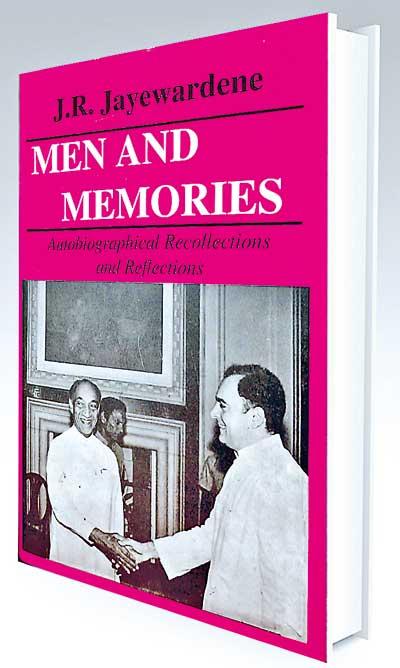JR’s ‘Men and Memories’ Of great political memories and a personification of aloofness
“Read no history: nothing but biography, for that is life without 
theory.” ~Benjamin Disraeli
Legacies are not created out of thin air. They are the sum of one’s lifetime’s successes and failures, of achievements and unfulfillments, victories and defeats and above all, one’s commitment to a cause and his lamentable vacillation from it. ‘Men and Memories-Autobiographical Recollections and Reflections’ by J. R. Jayewardene (JR) is no ordinary book penned by the subject himself. A lifetime of commitment to the panorama of local politics that spanned over five decades, from pre-independent Ceylon to the outer edge of the twentieth century, is drawn in the pages with an eldritch sense of detachment. Its richness in facts, clarity of mind that presented them and the detachment with which the story is told are extraordinary. In the annals of political biographies, ‘Men and Memories’ stands out as one that captures the reader’s attention to the minutest detail of a chaotic time between 1987 and 1989, but also to the macro picture of Ceylon’s development and ripening from a subject people to a sovereign family of men and women of the new world.
JR was no ordinary politician. His method of governance, his strategic planning, the ultimate achievement of its goals set upon that planning and the unmatched patience displayed by him throughout his life, could be an ideal subject matter for any postgraduate student to study and write a thesis on.
 Divided into ten chapters, JR begins, as he writes, ‘at the beginning’. And at the end of the preface to his autobiography, JR writes thus: ‘In the account of Men and Memories, which is not strictly an autobiography, I seek to present some autobiographical recollections and reflections which were inseparable from my life, and for over more than half a century of work. This I do in the hope that the contemporary and future generations would be enabled to understand the Agony and Ecstasy of Sri Lanka and her people with more insight, understanding and compassion.’ Then he paints the story of Ceylon from 1505, the invasion of coastal Ceylon by the Portuguese. A remarkable account of Ceylon’s political evolution from 1505 to 1948, is so succinctly written as an amateur historian, JR is more elaborate than some history textbooks we have read in our schools.
Divided into ten chapters, JR begins, as he writes, ‘at the beginning’. And at the end of the preface to his autobiography, JR writes thus: ‘In the account of Men and Memories, which is not strictly an autobiography, I seek to present some autobiographical recollections and reflections which were inseparable from my life, and for over more than half a century of work. This I do in the hope that the contemporary and future generations would be enabled to understand the Agony and Ecstasy of Sri Lanka and her people with more insight, understanding and compassion.’ Then he paints the story of Ceylon from 1505, the invasion of coastal Ceylon by the Portuguese. A remarkable account of Ceylon’s political evolution from 1505 to 1948, is so succinctly written as an amateur historian, JR is more elaborate than some history textbooks we have read in our schools.
Yet the evaluation of the book must be as objective as is possible. JR has not told any ‘untruths’. On the contrary, he has told ‘nothing but the truth’; yet in the same vein, he has not told the ‘whole truth’. Obvious omissions are glaring, maybe for a reason. If JR’s purpose was to present the changing historical drama in one hundred and ninety-two pages, he has certainly accomplished the task. But for a student of contemporary times and its immediate past, it is lacking in some personal underachievements and failures.
Indo-Lanka Accord
The narration of the Jayewardene-Gandhi Accord and its aftermath yearns for yet unknown details this writer has been privy to. His understatements regarding Prime Minister Premadasa’s unequivocal opposition, certain preconditions demanded by India as per Indian High Commissioner J.N. Dixit’s account as penned in ‘Assignment Colombo’ and the founding of the failed JVP-revolution in the ‘87-’89 period solely on Indo-Sri Lanka relationships cannot be disregarded as a matter of forgetfulness by JR. It was a deliberate skip.
JR’s critics would undoubtedly be harsher in their final assessment of his regimes and his overall political life given the consummate aloofness of demeanour JR always projected. This aloofness, unfortunately for JR himself, gave credence to the appraisal of his character as one who did not possess that one singular quality which all politicians should possess- empathy. However, in my own assessment, as one who had the privilege of being associated with him in official work, I challenge that view. JR was one politician whose empathy was second to none in Sri Lanka’s political leaders. Yet he never displayed that in a normal way; nor did he resort to cheap demeanour of some politicians who held others’ babies in their arms for the benefit of photographers.
Simply put, J. R. Jayewardene was the most misunderstood politician in Sri Lanka. He was misunderstood from the time he entered politics to the time he retired. Men and Memories is devoid of his personal likes and dislikes of a certain calibre of men and women. His remoteness was total and absolute. Allow me to give one single example of this quality of the man. I met him soon after his mammoth victory in the 1977 elections. Thereafter, I met him after the assassination of my close friend Harsha Abeywardena, the then Chairman of the UNP and also during Gamini Dissanayake’s funeral. JR portrayed the same face, the same countenance and the same equanimity. He was touched by the loss, but never rattled or distressed. Such stoic equanimity does not belong to ordinary men. That composure won him the ‘77 election; such stoicism won him many lifelong friends and disciples.
JR the Indophile
Inclusion of his correspondence with Jawaharlal Nehru and other Indian leaders of the nineteen forties, his famous speeches at the SAARC meetings in the nineteen eighties and his devotion to the ideals pursued by Gandhi and other Indian leaders give a glimpse of the depth and breadth of his understanding of the geopolitical contexts of a forgotten era. The profuseness of his knowledge, comprehension of contemporary issues with a geopolitical connection and personal relationships with the Indian leaders add to a subtle and profound mindset of a leader whose unfortunate legacy happens to be his failure to tackle the 1983 Tamil riots and its immediate aftermath. The only time he tends to be emotional, if it was emotional at all, was when he mentions the names of Nehru and Gandhi and one other local politician, D.S. Senanayake. Being the only locally educated member of Ceylon’s first Cabinet, except D.S himself, all others educated abroad, either at Oxbridge or other prestigious universities in the United Kingdom (UK), JR held the most pivotal portfolio, Finance. Yet, that subtle empathetic feeling never found expression in JR’s speeches, actions or personal conduct.
I have personally met JR many a time. Allow me to mention below one incident that would live long, until my last breath: In the context of the recent history of Sri Lanka, it is quite significant. After the election defeat in 1994, being the leader of the Kandy District (only, Kandy, Nuwara Eliya and Badulla Districts were secured by the UNP), Gamini Dissanayake (GD) decided to contest Ranil Wickremesinghe, the outgoing Prime Minster, for the position of the Leader of the Opposition. Gamini and I came down to Colombo and we had a hurried meeting at his residence. Those who attended the meeting were Gamini, Dr. Wickrema Weerasooria, Rohan Pethiyagoda (GD’s other brother-in-law), Srima Dissanayake (Gamini’s wife) and myself. It was the consensus of all of us that GD should contest Ranil for the Leader of the Opposition position. It was also decided that GD should immediately inform Ranil personally by calling on him wherever he was at the time.
After some difficulty, I managed to locate where Ranil was. He was at Temple Trees. GD and I got into the former’s bullet-proof Volvo and started heading towards Temple Trees. For a minute it occurred to me to look who was there with us that day. The driver was Piyasena and the personal security guard was Mahatung and the other was me. All three had joined GD when he was an ordinary MP in the 1970 Parliament, a way before GD became a Minister. The original team was there in that car. On our way, when we turned our car to 5th Lane on the way to Galle Road, I received a call on my mobile phone. It was Pradeep Jayewardene, JR’s grandson. He told me thus: ‘Palitha, ‘Seeya’ (grandfather) wants to meet GD asap’. When I conveyed that to GD, he said that he would see him after meeting Ranil.
The book- ‘Men and Memories-Autobiographical Recollections and Reflections’- is a remarkable account of Ceylon’s political evolution from 1505 to 1948 and is so succinctly written as an amateur historian that J.R. Jayewardene’s creation is more elaborate than some history textbooks we have read in our schools
When we visited JR, he was fresh after a bath, emanating a lovely scent of the soap he used. He asked us to sit down and what he began to relate to us was no ordinary stuff. It was like a superior professor lecturing a class of keen students. I give below in a nutshell of what he said: ‘Gamini, when Dudley passed away I was holidaying in Mirissa (a town in the Deep South in Sri Lanka). On hearing of the news, I immediately took off for Colombo and dropped my wife at Braemar and headed straight for ‘Sirikotha’ (UNP headquarters). The meeting had started but the head-chair was vacant. That was the chair which was usually occupied by Dudley as the leader of the party. I did not ask anybody; went straight to that seat and sat down. I started to conduct the meeting. After that, they accepted me as the leader of the Party. No one dared contest me; no one challenged my position. Gamini, JR said, this Party is yours. Go and take it over. Nobody is going to give it to you on a platter. You assume leadership and bring back the honour that we have lost in the recent past’. No mention of the outgoing Prime Minister, Ranil Wickremesinghe, his mother’s niece’s son.
JR, at the time in 1994, was 89 years ‘young’; he was never clearer than on that occasion. In those few minutes, not exceeding twelve or thirteen in all, he gave us a free lesson on the ups and downs of politics; how to attain leadership of one of the two leading political parties in Sri Lanka. His profile while delivering these unforgettable words was devoid of emotion; devoid of laughter or sadness; it was clear, cold, calm and above all else, aloof and detached. It was quintessential JR! It is with that same coldness, same clarity, same calmness and same detached and aloof manner he has written his autobiographical story.
The writer can be reached at palithapelpola@gmail.com






